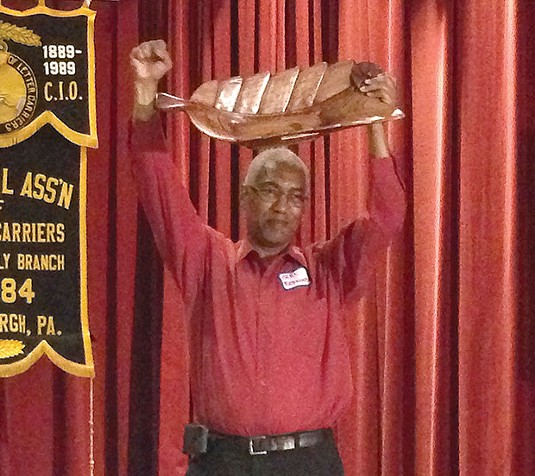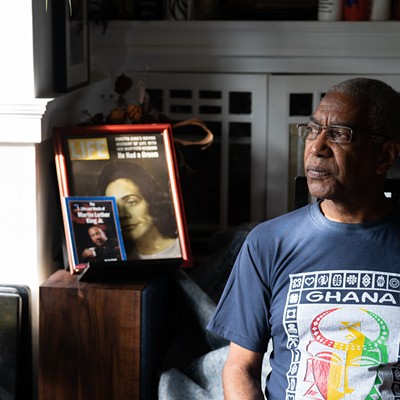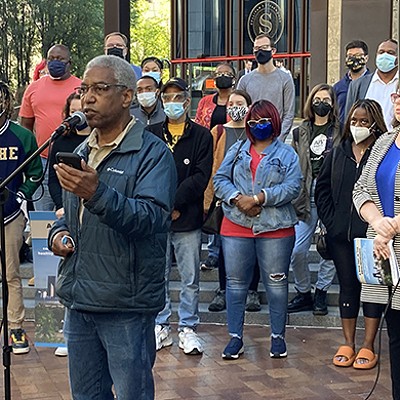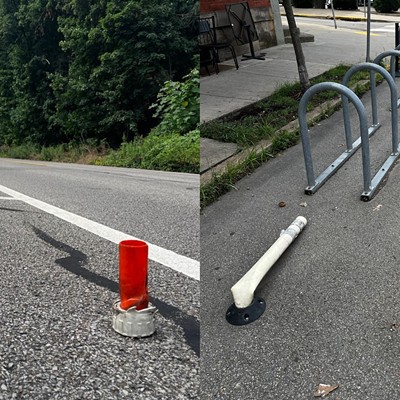On June 26, local housing activist Carl Redwood was honored by Garfield’s social-justice advocacy group the Thomas Merton Center. Redwood received the center’s 2017 New Person Award for his decades-long work advancing causes of racial, economic and social justice in the Pittsburgh area and beyond. Local artist/activist Vanessa German spoke at the event and sang his praises.
“Carl Redwood is a song weaver,” she said. “Carl will stand up to sing the song to us all. He is not afraid to say ‘another world is possible.’”
Pittsburgh City Paper spoke with Redwood after the award ceremony to discuss his role and the future of activism in Pittsburgh.
What are some of your successes as an activist?
The main thing was the creation of the Hill District Consensus Group, in terms of local neighborhood stuff. The consensus group started in the Hill District, and we also have a lot of consensus groups in a lot of different neighborhoods, which are ways to try to get people in the community to work together and to plan a future that works for them.
And there are other areas too. I was active among the African-liberation support committee, supporting the liberation movements in Angola, Mozambique, Guinea-Bissau. I was also part of the Free South Africa Movement, where we worked to get Nelson Mandela out of jail.
We have had some victories, but in the recent times, we have been winning skirmishes but losing the war in terms of housing and the displacement of black people from the city. We are losing people, so we are not winning on those fronts.
What needs to be done to improve these problems?
What we need to do is create a new political instrument that can represent folks. And also, name what the source of our oppression is, which is really capitalism. Not saying we don’t fight on reforms. But sometimes we just change policies, but maintain the system as it is. And what happens is, people’s lives get worse.
Even when we fight for those policy changes, which we know won’t change the system, we have to link it to the system that we know is the problem. Almost every issue is linked to capitalism being at the root of the problem. It may not be that way for racism, because racism existed before capitalism and will exist after capitalism. But in terms of the basic way society is set up, private profit for a small minority drives everything. And because that drives everything, it distorts everything. So we can fix the edges and we can get 20 [Democrats] back into the [U.S.] House. But we lost 20,000 black Pittsburghers from 1980 to 2010; we are losing three black people a day from the city of Pittsburgh. Even if we tinker with the edges of the problem, we have to go to the root. Not saying we can eliminate it right away, but over time we can.
When people challenge capitalism, they’re typically labeled an “unhinged radical.” Can people be convinced otherwise?
We have to change that. We have to push back and make that the norm, and not the exception. The United States went through this whole McCarthy era, where there were real consequences for speaking radically. And there still may be consequences in the future, but that shouldn’t stop us from doing it. We’ve got to speak what is right. Like Martin Luther King said, ‘We’ve got to commit ourselves to the long, bitter struggle to create a new world.’ We all see what the root is. It’s harder to name it at different time periods. But it’s not as hard to name it today. Bernie Sanders says he is a socialist; it’s a different time. We’ve got to take advantage of this window we are in. But we don’t have the answer at this point. And the answer is not the 20th-century socialism from other countries. We’ve got to create a 21st-century socialism that will look very different.
In your acceptance speech you talked about building up local groups. Why is that important?
We have to build strong [coalitions] in the neighborhoods around principled programs that support the majority of folks. And we have to get people to see that. It’s not about rich people in high places or even elected officials. It’s about what can people do and the power that we can build in the neighborhood. The power has to be the people organized in the neighborhoods. We haven’t been base-building, and the Democratic Party kind of co-opts the different movements, but doesn’t really get the essence of what the movements are about. And when it comes back from the [Democrats], it’s not the same thing. Obamacare was not what people wanted; they wanted health care for everybody. But it came back in another form that still benefited the profiteers.
(Editor’s note: This interview has been edited for space and clarity.)



















